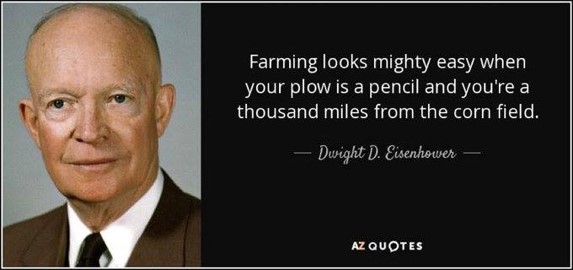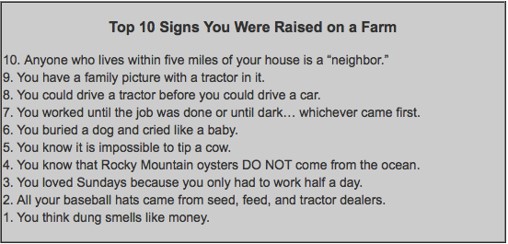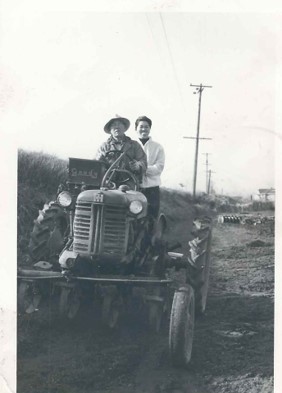 |
Did you hear Michael Bloomberg’s insulting comment about farmers? It was a while back, but due to his presence on the public stage recently, it’s being brought back around.
In a nutshell, he said that farmers can’t work in IT because it requires “a lot more gray matter.” He thinks that farming is easy because it’s a process that you could “teach anybody.”
He couldn’t be more wrong.
But don’t be too hard on Bloomberg. People, including me, say stupid things all the time. Most Americans have no idea how much hard work it takes to put vegetables on their grocery store shelves.
 |
If you’ve been with me for a while, you’ll know that I was raised on a vegetable farm in western Washington.
My parents were hard-working vegetable famers. Making ends meet was always a struggle. My classmates laughed at my hand-me-down clothes and logger boots with holes in the soles.
But it was a good home. I never went to bed hungry and my mother kissed me goodnight every night until I left for college.
 |
Bloomberg is wrong; farm work is very hard. So hard that I hated it as a youth. But now? I think that those years on the farm are the foundation of the success that I enjoy today.
Moreover, there’s a surprising number of investment lessons that I learned as the son of a farmer. Here are six ...
Lesson 1: Boring Work Is the Most Important Work
Farming is far from glamorous. Most of the work my parents had me do was dreadfully boring.
When I was kindergarten age, my father would have me pick rocks out of the fringes of the farm. In the summer, I spent thousands of hours on my hands and knees pulling up weeds. It was boring and seemed meaningless at the time, but every successful business needs a strong foundation, and the basic building blocks of preparing the soil is crucial.
The same is true of investing. Reading annual reports, financial statements and balance sheets can be boring. But that fundamental, time-consuming research sets you up for long-term success.
Lesson 2: Summer Profits Come from Winter Efforts
My non-farmer friends assumed farmers took it easy during the winter. Wrong! Even when snow covered the ground, my father still worked a minimum of 12 hours a day.
There may not have been any crops to harvest in winter, but there was always plenty of off-season work to do on the farm, such as repairing the farm machinery and mending fences. The work done in the winter set us up for success in the summer.
The same is true of investing: You make your profits before you buy a stock, not after you sell it.
Lesson 3: Core and Explore
The most important decision every farmer makes is what to plant. The price of vegetables could vary widely from year to year. Many farmers would play a Green Acres version of roulette by trying to anticipate what the “hot” vegetable of the year would be.
 |
Not my father! He stuck to red radishes and green onions for roughly 80% of our farmland. He only gambled with the last 20% of our land on the crops he thought could deliver big payoffs.
I do the same with my portfolio today. I keep the vast majority of my portfolio in stable, established blue-chip companies and use the last 20% or so for more speculative bets.
This split will allow you to harvest dependable investments and still have room to invest in riskier, but potentially more profitable, stocks.
Lesson 4: Profits, Not Revenues
What makes one farmer more successful than the other?
Many of our neighboring farmers also grew radishes and onions, too. But they weren’t as successful. What made my father more successful was that he knew it isn’t how much you harvest, but how much profit you make on what you do grow.
My father was a very frugal man. He seldom bought anything that wasn’t on sale. So, his cost was lower than most of his competitors’.
I’m a cheapskate, too, so I seldom buy stocks unless they go on sale. You’ve probably heard the warning, “Don’t try to catch falling knives.” Well, I love falling knives.
Wait for short-term pullbacks to buy rather than pay top-dollar.
Lesson 5: Plow Under Your Mistakes
Sometimes things just went wrong on the farm.
Insects would infest our crops ... some months were so wet there would be mold outbreaks ... and some years frost would come too early or arrive too late and damage the crops.
Instead of spending too much time and/or too much money on rescuing the damaged crops, my father would often plow them under and start over.
My father was a big believer in cutting your losses and moving on. I find that many investors are too stubborn to admit a mistake or want to wait until they “break even” before selling.
Don’t be too proud to admit an investment isn’t working. Cut your losses and move to greener pastures.
Lesson 6: Expect Storms
Whether or not my father had a good year depended on three things:
1) No late frosts
2) No early frosts
3) No natural disasters like hailstorms, droughts or massive insect infestations.
While you can’t avoid disasters, you can plan for them and run for cover when they do come. The wise investor diversifies in anticipation of those things that are beyond his control and buys insurance to protect against catastrophic losses.
That is pretty wise advice for the current market.
If you’re so heavily invested in stocks that you’re losing sleep over the recent volatility, you are NOT diversified enough.
You should consider either increasing your allocation to cash or purchasing some portfolio insurance like bonds or gold ... even if it means taking a small loss to do so. It’s better than taking a bigger loss later.
Best wishes,
Tony Sagami

